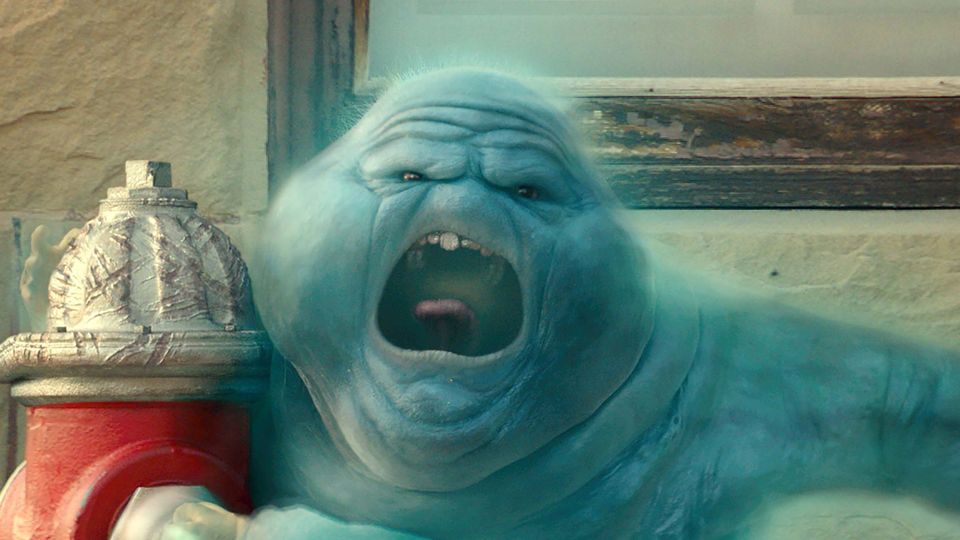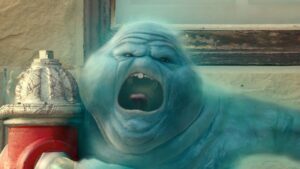“Ghostbusters: Afterlife” Fails To Live Up to the Original

 After the disaster that was 2016’s Ghostbusters, Jason Reitman, the son of the original film’s director, is ready to bring the franchise back to its roots. Taking place 37 years after the events of Ghostbusters (1984), Ghostbusters: Afterlife follows Trevor (played by Finn Wolfhard) and Phoebe (played by Mckenna Grace) as they move into their recently deceased grandfather’s farm in Summerville, Oklahoma. The move is much to the dismay of their mother Callie (played by Carrie Coon), as she and her father had an almost nonexistent relationship. Phoebe eventually finds out, with the help of one of her teachers, Mr. Gooberson (played by Paul Rudd), and a new friend of hers, Podcast (played by Logan Kim), that her late grandfather was none other than Egon Spengler: one of the original ghostbusters.
After the disaster that was 2016’s Ghostbusters, Jason Reitman, the son of the original film’s director, is ready to bring the franchise back to its roots. Taking place 37 years after the events of Ghostbusters (1984), Ghostbusters: Afterlife follows Trevor (played by Finn Wolfhard) and Phoebe (played by Mckenna Grace) as they move into their recently deceased grandfather’s farm in Summerville, Oklahoma. The move is much to the dismay of their mother Callie (played by Carrie Coon), as she and her father had an almost nonexistent relationship. Phoebe eventually finds out, with the help of one of her teachers, Mr. Gooberson (played by Paul Rudd), and a new friend of hers, Podcast (played by Logan Kim), that her late grandfather was none other than Egon Spengler: one of the original ghostbusters.
Ghostbusters: Afterlife, in much contrast with the abundance of soft reboots being promoted today, actually works best when it utilizes the iconography of the original film. Much of the production design, when CGI isn’t the main focus and the 1980s atmosphere takes hold, works well in the context that this is a sequel built on a nostalgic foundation.
The film’s emotional core of the character relationships, on the other hand, becomes squandered, since nearly every scene has to have a joke hastily added on. Scenes flip on a dime, going from heavy family drama to light comedy. The tone is so messy that it’s hard to tell what Reitman is trying to accomplish with the emotional beats. The original Ghostbusters film has a dynamic where not every character would make an attempt at comedy. Egon, who the film ironically enough pays tribute to, was the straight man of the group, something that Afterlife sadly lacks. Most of the comedy relies on the child actors who, while they don’t deliver terrible performances, have poor comedic timing that leads to the humor being awkward and stilted in a way that doesn’t seem intentional. Ghostbusters (1984) had its fair share of jokes, but they meshed well with the story and didn’t interrupt the flow of a scene.
The story structure of Afterlife leads to the film being unbalanced. The beginning is so exposition-heavy, that it doesn’t progress naturally into the end finale. Scenes dedicated to finding out Egon’s identity and the secrets of Summerville are so prominent that there’s little breathing room for character development, leaving main characters like Trevor and Lucky (played by Celeste O’Connor) feeling hollow, as they were given nothing script-wise to build their relationship. Trevor, who would be expected to have a large stake in the plot, being one of Egon’s grandchildren, has such little presence in the story that his character could be written out and very little would change.
Jason Reitman undoubtedly put effort into trying to capture the magic of the original, but the result is a poorly-paced sequel devoid of a cast that has chemistry with each other. Without its shameless ties to Ghostbusters (1984), Ghostbusters: Afterlife would have little to stand on.
Grade: D+